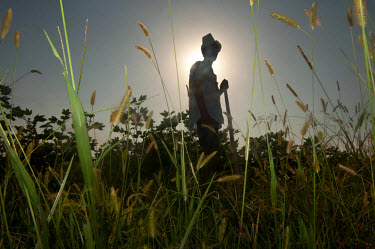Blog-Irrigation Management
Best Management Practices for Non-Conventional Water Resources Use in Irrigation

Non-Conventional Water Resources
©FAO
Pressures on water resources are increasing in many arid and semi-arid countries due to limited available freshwater resources, rapid population, and increasing demand for water in all different sectors, with agriculture at the top of the list. Climate change impacts such as rising temperatures, increasing crop water requirements, and severe drought and floods will bring even more pressure on the agricultural sector which necessities utilizing and managing all available resources in proper and sustainable ways.
These resources include not only water resources such as conventional & non-conventional water, agricultural drainage water, saline groundwater aquifers, shallow brackish and treated wastewater resources, but also soil, crops, weather conditions, and existing irrigation and agricultural drainage systems. All these resources and factors must be managed collaboratively with farmers in an integrated and sustainable manner.
There are valuable and useful practical alternatives to integrated water resource management that should be considered, whether conventional or non-conventional, and it is becoming a must in some areas due to freshwater scarcity:
- Cycle irrigation: Farmers already cycle between fresh and drainage water during the cropping season based on water availability. If fresh water is available during the crop establishment stages, this could be done successfully. As a result, equitable distribution of canal freshwater at the beginning of the season is critical and should be prioritized by irrigation water supply authorities as crop demand is lower during this period, allowing for more widespread distribution of freshwater.
- Inter-seasonally Cycle: Cycling between fresh canal water and drainage water inter-seasonally also appears to be feasible. This could help simplify fresh canal water delivery and drainage water canal management. However, farmers would have to accept this proposal and trust that the authorities would undertake the cycle rather than making fresh or drainage water delivery permanent. Farmers would also need to be able to manage the reduction in income which may result from lower yields, over a long period. As a result, given its limited use in comparison to other current practices, this option merits deep investigation.
- Controlled drainage + Deficit Irrigation: In order to conserve freshwater for irrigation the option of implementing controlled drainage or water table management and reducing the number of irrigations late in the season (deficit Irrigation) shows great potential to save irrigation water without a yield penalty. Implementing this option appear to be a logical first step towards conserving scarce irrigation water. If implemented widely, it would also help freshwater/drainage water intra-season cycling by making more freshwater available.
All the above strategies rely on a fully functioning drainage system. This drainage requirement is critical for being able to use water - at different salinity levels - for irrigation in a sustainable manner and should thus be prioritized in agricultural investments. On the other side, the above-examined practices/ applications require economic analysis and piloting with farmers so that they can be tailored to the specific conditions of any locality before widespread.
Dr. Eng / Mohamed A. Shehata Wahba
Vice President Honoraria (VPH) - International Commission on Irrigation and Drainage (ICID)
Chairman - African Regional Working Group (AFRWG) – ICID
Chairman - Working Group of Capacity Development, Training and Education (WG-CDTE)-ICID
Ex-Chairman - Egyptian National Committee on Irrigation and Drainage (ENCID)
Emeritus Researcher - Drainage Research Institute, NWRC, MWRI-Egypt
Adviser - WCCO, Yangzhou, China
E-mail: [email protected]; [email protected]
Mobile: +201003965239
